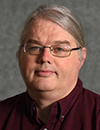Professor’s Authorship Software Provides Insight into True Identity of Beloved Italian Author
Since Italian author Elena Ferrante’s first novel was published in 1992, fans and literary critics alike have wondered—who is Elena Ferrante? Italian reporter Claudio Gatti claimed in 2016 that he had uncovered the true identity of the beloved author as Anita Raja, a Rome-based translator and wife of Neapolitan writer Domenico Starnone.

New findings co-discovered by Computer Science Professor Dr. Patrick Juola may have revealed otherwise.
Juola and other members of a team of international experts invited to Italy’s University of Padua have discovered—through their own respective methodologies—that Ferrante is quite possibly a pseudonym for Starnone himself.
Utilizing Java Graphical Authorship Attribution Program (JGAAP)—a computer program that he developed called—Juola performed a mathematical analysis of the degree of similarity between word usage in different texts to determine whether or not they were written by the same person. This same program helped Juola to identify Robert Galbraith, author of The Cuckoo’s Calling, as a pseudonym for famed author of the Harry Potter Series, J.K. Rowling in 2013.
In Padua, Juola and the other experts independently analyzed a collection of 150 novels written in the last 30 years by 40 different authors to find a match for Elena Ferrante’s writing style utilizing their respective methodologies.
While each independent analysis of the novels concluded that Ferrante’s writing was most similar to that of Starnone’s, the researchers could not confirm it as fact—Raja has no published novels and could not be included in the dataset. However, one methodology used found that Ferrante’s writing was similar to a male, more than 60 years old, from Starnone’s home village—demographical information that does not match Raja.
“While we hope to get a formal publication included in a scholarly forum in the future, I hope our work will spur more inquiry into Ferrante’s work,” Juola said. “More than that, I hope our research sheds light on what this kind of authorship study can do.”
